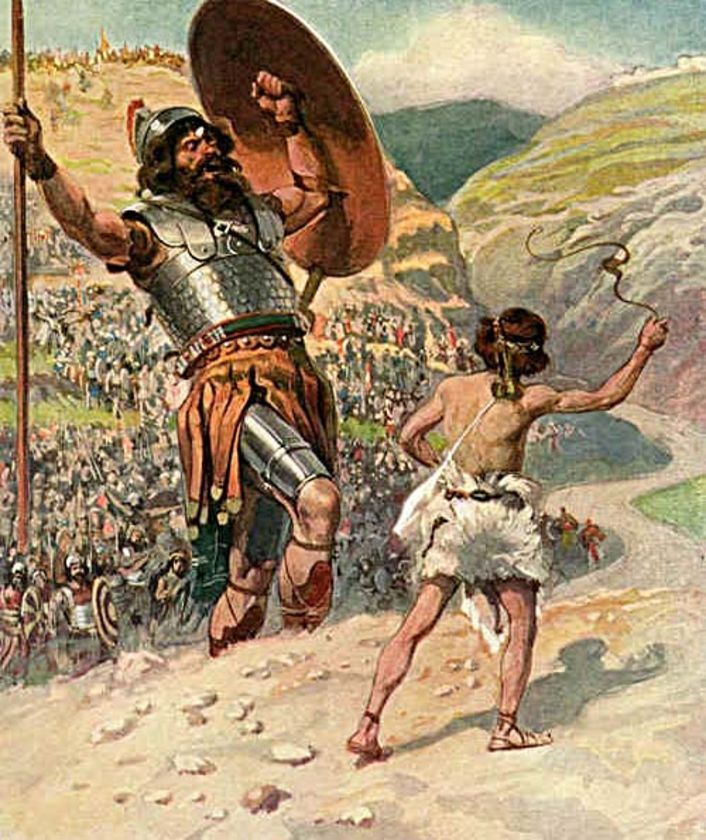How David Beats Goliath

Using examples from the Bible (David vs. Goliath), military history (Lawrence of Arabia’s revolt against the Ottoman Army occupying Arabia near the end of World War I) and the Redwood City (Calif.) National Junior Basketball team (made up of 12-year-old girls), New Yorker author Malcolm Gladwell spins a spirited yarn about how and when effort can trump ability.
Gladwell writes, “David can beat Goliath by substituting effort for ability—and substituting effort for ability turns out to be a winning formula for underdogs in all walks of life, including little blond-haired girls on the basketball court.”
Only two of the Redwood City girls could dribble and shoot the rock. The team was coached by a dad who had emigrated from India and knew next to nothing about the game. Puzzled by why teams retreated to the other end after making a field goal, he taught his unskilled crew to press full-court after every possession.
The coach said, “We followed a soccer strategy in practice. I would make them run and run and run. I couldn’t teach them skills…so all we did was make sure they were fit and had some basic understanding of the game. That’s why attitude plays such a big role in this, because you’re going to get tired.”
What happened? The Redwood girls made it all the way to the third round of the Nationals, where they lost a game in which the referees called four times as many fouls on them as they did on their opponents, forcing them to abandon their strategy.
“The puzzle of the press,” writes Gladwell, “is that it has never become popular”—despite its effectiveness. And he tells the story of Rick Pitino, who used the press to take Boston University to its first NCAA appearance; Providence College, which had gone 11-20 the year before and whose players were “short and almost totally devoid of talent,” to the national championship; and the University of Kentucky to the Final Four three times, winning a national championship.
Gladwell: “We tell ourselves that skill is the precious resource and effort is the commodity. It’s the other way around . . . legs can overpower arms—because relentless effort is in fact something rarer than the ability to engage in some finely tuned act of motor coördination.”
The message to all you STACKletes out there who play with unskilled teammates or on losing teams: you do have a way to turn things around. It’s spelled E-F-F-O-R-T.
Be sure to check out the full article, which is terrific, here.
Photo: freerepublic.com
RECOMMENDED FOR YOU
How David Beats Goliath

Using examples from the Bible (David vs. Goliath), military history (Lawrence of Arabia’s revolt against the Ottoman Army occupying Arabia near the end of World War I) and the Redwood City (Calif.) National Junior Basketball team (made up of 12-year-old girls), New Yorker author Malcolm Gladwell spins a spirited yarn about how and when effort can trump ability.
Gladwell writes, “David can beat Goliath by substituting effort for ability—and substituting effort for ability turns out to be a winning formula for underdogs in all walks of life, including little blond-haired girls on the basketball court.”
Only two of the Redwood City girls could dribble and shoot the rock. The team was coached by a dad who had emigrated from India and knew next to nothing about the game. Puzzled by why teams retreated to the other end after making a field goal, he taught his unskilled crew to press full-court after every possession.
The coach said, “We followed a soccer strategy in practice. I would make them run and run and run. I couldn’t teach them skills…so all we did was make sure they were fit and had some basic understanding of the game. That’s why attitude plays such a big role in this, because you’re going to get tired.”
What happened? The Redwood girls made it all the way to the third round of the Nationals, where they lost a game in which the referees called four times as many fouls on them as they did on their opponents, forcing them to abandon their strategy.
“The puzzle of the press,” writes Gladwell, “is that it has never become popular”—despite its effectiveness. And he tells the story of Rick Pitino, who used the press to take Boston University to its first NCAA appearance; Providence College, which had gone 11-20 the year before and whose players were “short and almost totally devoid of talent,” to the national championship; and the University of Kentucky to the Final Four three times, winning a national championship.
Gladwell: “We tell ourselves that skill is the precious resource and effort is the commodity. It’s the other way around . . . legs can overpower arms—because relentless effort is in fact something rarer than the ability to engage in some finely tuned act of motor coördination.”
The message to all you STACKletes out there who play with unskilled teammates or on losing teams: you do have a way to turn things around. It’s spelled E-F-F-O-R-T.
Be sure to check out the full article, which is terrific, here.
Photo: freerepublic.com










